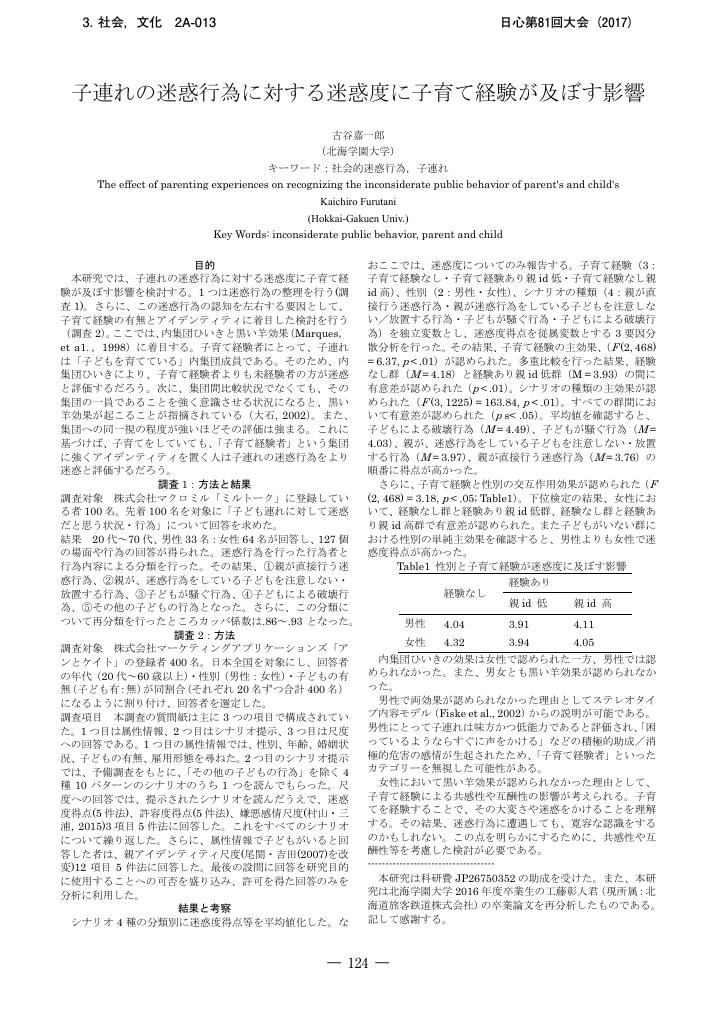58 0 0 0 OA 子連れの迷惑行為に対する迷惑度に子育て経験が及ぼす影響
- 著者
- 古谷 嘉一郎
- 出版者
- 公益社団法人 日本心理学会
- 雑誌
- 日本心理学会大会発表論文集 日本心理学会第81回大会 (ISSN:24337609)
- 巻号頁・発行日
- pp.2A-013, 2017-09-20 (Released:2020-03-27)
10 0 0 0 OA 反すうが自動思考と抑うつに与える影響
- 著者
- 西川 大志 松永 美希 古谷 嘉一郎
- 出版者
- 公益社団法人 日本心理学会
- 雑誌
- 心理学研究 (ISSN:00215236)
- 巻号頁・発行日
- vol.84, no.5, pp.451-457, 2013-12-25 (Released:2014-03-01)
- 参考文献数
- 40
- 被引用文献数
- 7 1
This study investigated the effects of rumination (reflective pondering and brooding) on automatic thoughts (both negative and positive) and depressive symptoms. University students (N=183; 96 men) completed the Self-Rating Depression Scale (SDS), Automatic Thoughts Questionnaire-Revised (ATQ-R), and Response Style Scale (RSS). We conducted a path analysis which included gender as a factor. The results revealed that brooding was associated with negative automatic thoughts. Negative automatic thoughts contributed to the aggravation of depressive symptoms. In contrast, reflective pondering was associated with positive automatic thoughts. Positive automatic thoughts contributed to the reduction of depressive symptoms. These results indicate that rumination does not affect depressive symptoms directly. We suggest that rumination affects depressive symptoms indirectly through automatic thoughts, and that there are gender differences in the influence process.
- 著者
- 古谷 嘉一郎 坂田 桐子
- 出版者
- 日本社会心理学会
- 雑誌
- 社会心理学研究 (ISSN:09161503)
- 巻号頁・発行日
- vol.22, no.1, pp.72-84, 2006
- 被引用文献数
- 1 5
In this research, we considered in what way face-to-face, mobile phone, and Short Message Service (SMS) modes of communication are associated with the relationship satisfaction of samesex friends. Specifically, from a media and content suitability perspective, we investigated 9 modes of communication, 3 media (face-to-face, mobile phone, and SMS)×3 types of content (task, emotional, and consummatory), and their association to relationship satisfaction. The results showed that relationship satisfaction and mode of communication were different for friendships where the partners were physically near each other and could see each other face to face even daily (short-distance friendship) and friendships where partners were physically separated and could only rarely meet face to face (long-distance friendship). Primarily, for short-distance friendships, a positive relation was observed for face-to-face consummatory communication and relationship satisfaction. Additionally, for long-distance friendships, SMS consummatory communication had a positive relationship with relationship satisfaction. We looked at these results from interpersonal research and communication research perspectives.
- 著者
- 片桐 咲恵 西村 太志 古谷 嘉一郎 相馬 敏彦 小杉 考司
- 出版者
- 山口大学教育学部
- 雑誌
- 研究論叢. 第3部, 芸術・体育・教育・心理 (ISSN:02860597)
- 巻号頁・発行日
- vol.66, pp.83-94, 2016
